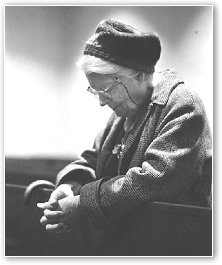Christ in the face of all
- CHARLES LEWIS
It was a sight of beauty. Perhaps as beautiful a thing as I have ever seen.
 Dorothy Day, Obl.S.B.
Dorothy Day, Obl.S.B.1897-1980
I saw it during morning rush hour on a freezing cold day in front of a busy Toronto bus stop. I was driving and fortunately the light turned red, allowing me to look more closely at what was taking place.
The woman was in her 30s, maybe younger, and dressed elegantly. She was talking to a man who lay prone on the sidewalk, covered in a ratty sleeping bag and newspapers. His face was hidden. She was crouched and he was barely up on one elbow to look at her. Her face was warm, gentle and inviting as she looked into the face of this man's misery. But it was her smile that hit me. She looked like she had all the time in the world. She was looking at this frozen wreck of a man and pouring out love and compassion.
I tried later to imagine what this man felt before she knelt beside him. He was likely in pain — if for no other reason than lying on frozen concrete. His skin probably itched like crazy because of his unwashed skin and filthy clothes. If he was lucky he was used to his own smell. His lot in life seemed the furthest thing from what most would consider dignified.
Then suddenly a face appears before him. Some total stranger hovering over him, smiling, as if she had bumped into a beloved old friend. For that one moment, she reminded him that despite his circumstances he was worthy of love.
As Catholics we are supposed to believe that every human being is made in the image of God and has inherent dignity. And because we believe in the Trinity we know that God is in a continual relationship of love. We are told to love God and neighbour, and in the radical teaching of the Gospel neighbour means everyone.
So in that sense the act of looking into the face of the least of us is not just kindness but a duty.
There are a million reasons not to: a meeting to catch, only a short break for lunch, fear of the unknown. It would also be easy to say this fleeting act of mercy really didn't matter. What was one gesture to a man whose life is endless filth, cold and hunger?
But it did matter. It meant everything.
Imagine if during the same day 20 people repeated her gesture. What would that look like? What if everyone was a bit late for the same meeting because of some simple act of kindness? Would anything have been lost, especially compared to what had been gained?
I may be naïve — some kind of fool that does not accept the reality of the world. Even Jesus said the poor would always be with us.
"We have all known the long loneliness, and we have found that the answer is community." - Dorothy Day
Though, Christ did not say that it was okay the poor be stepped over and ignored. Then there is Matthew 25 and the parable of the sheep and goats. There is no question what Jesus asked us to do and the consequence of ignoring what is before us.
In The Long Loneliness, Dorothy Day reflected on how she became a Catholic in 1926 in New York City. She made a decision that to follow the Gospel she would have to change her life — from a hard-drinking journalist who rubbed elbows with America's most provocative literary artists to a witness to the dire poverty she saw all around her. She humbled herself by living among the most destitute, spending her time finding food and shelter to bring a modicum of comfort to the forgotten. She called her shelters Catholic Worker homes. She even created a newspaper, at one-cent a copy, called the Catholic Worker — meant to promote her ideas of radical Christian love. She was extreme.
Very few could do what she did. Her cause for sainthood is underway. It cannot come too soon. The world needs to know about her heroic deeds. Not for Day's own glory but for the glory of what Christ taught.
Day did have a warning. She knew that love lived was rarely flowers and poetry. The most difficult thing was to seek the face of Christ in the most desperate and then respond as if were true.
"Love in action," she wrote, "is harsh and dreadful when compared to love in dreams."
 This is Meaghen Gonzalez, Editor of CERC. I hope you appreciated this piece. We curate these articles especially for believers like you.
This is Meaghen Gonzalez, Editor of CERC. I hope you appreciated this piece. We curate these articles especially for believers like you.
Please show your appreciation by making a $3 donation. CERC is entirely reader supported.

Acknowledgement
 Charles Lewis. "Seeing Christ in the face of all: we are worthy of love." The Catholic Register (February 10, 2016).
Charles Lewis. "Seeing Christ in the face of all: we are worthy of love." The Catholic Register (February 10, 2016).
Reprinted with permission of The Catholic Register.
The Author
Charles Lewis writes from Toronto.
Copyright © 2016 The Catholic Register



